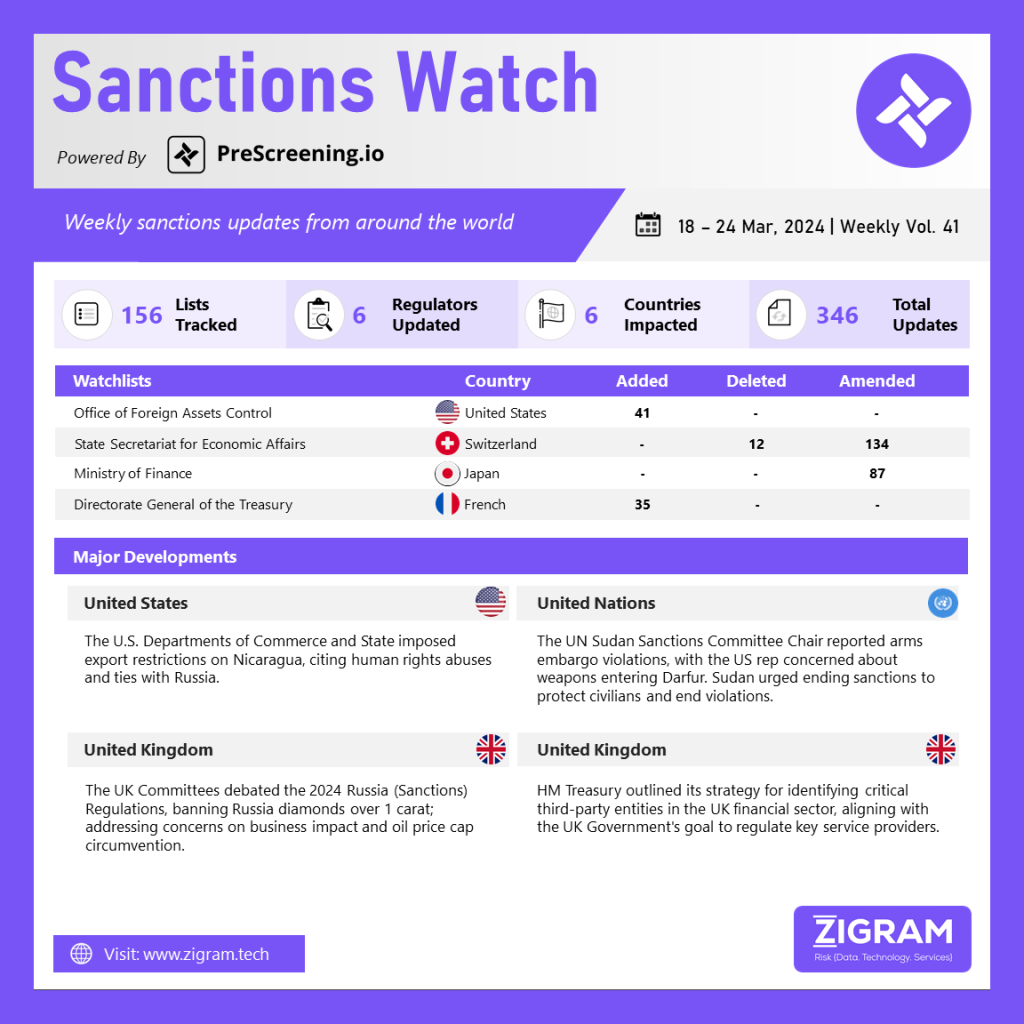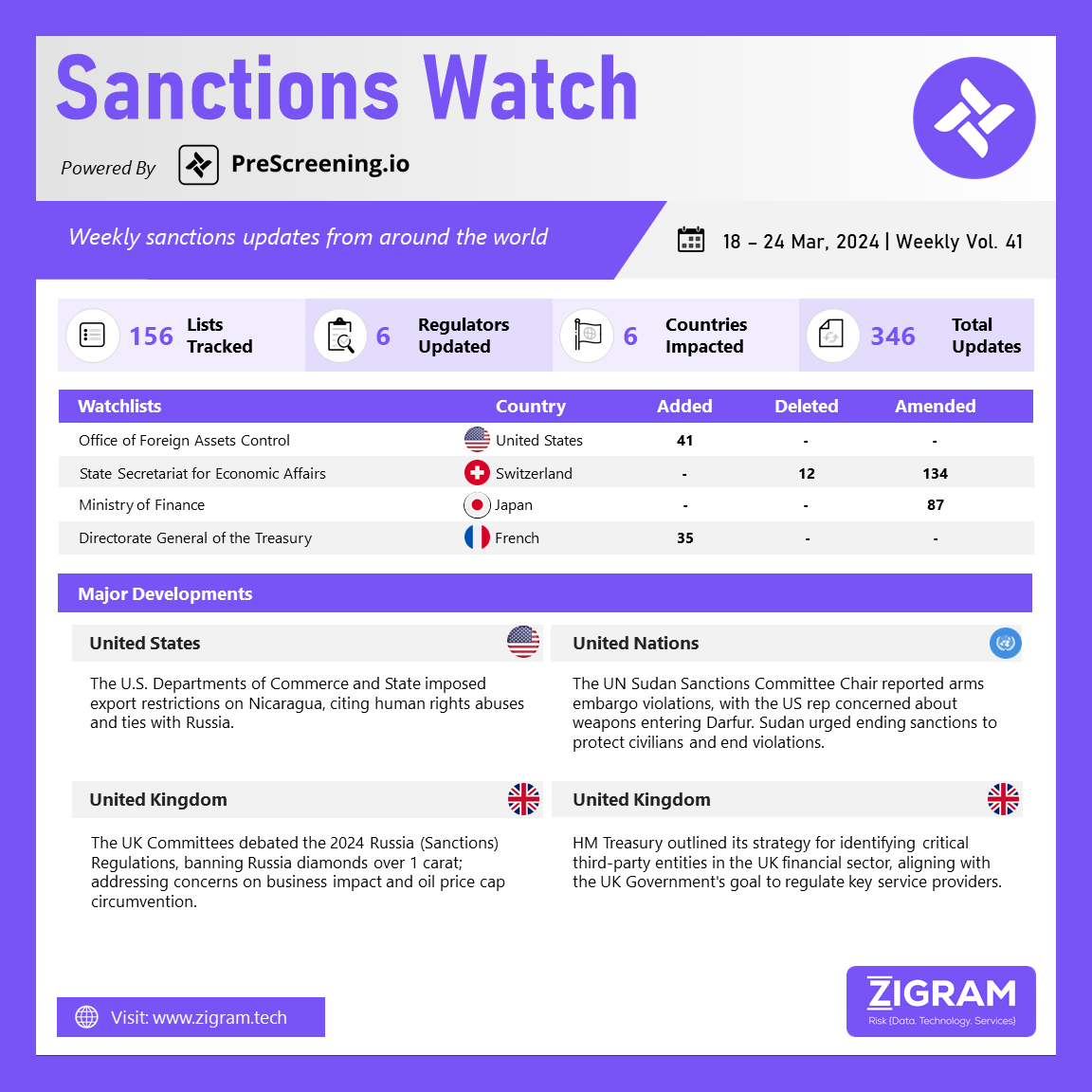Published Date:
In the latest edition of our Sanctions Watch weekly digest, we present significant updates on sanction watchlists and regulatory developments.
On March 14, 2024, the U.S. Departments of Commerce and State issued rules limiting exports to Nicaragua due to the government’s repression and human rights violations. The Commerce Department’s Bureau of Industry and Security (BIS) finalized a rule imposing restriction, such as end-use and end-user prohibitions, on exports of certain items subject to the Export Administration Regulations (EAR). Simultaneously, the Department of State amended the International Traffic in Arms Regulations (ITAR) to include Nicaragua in its list of Section 126.1 prohibited countries. These actions aim to address ongoing foreign policy and national security concerns regarding the Nicaraguan government’s actions, including crackdowns on democratic movements, targeting of peaceful protestors, involvement in death squads, and carrying out extrajudicial killings, disappearances, and kidnappings. BIS also highlighted Nicaragua’s deepening military and security ties with Russia, including its support for Russia’s invasion of Ukraine. The State Department expressed its commitment to using diplomatic and economic tools to support human rights and fundamental freedoms in Nicaragua.
The Chair of the UN Sudan Sanctions Committee briefed the Committee on violations of the arms embargo. The US representative expressed concern over the significant transit of weapons into Darfur from Chad, Libya and the Central African Republic. The Sudanese representative reiterated the government’s stance that the punitive measures imposed by the Sanctions Committee are no longer appropriate. Ending sanctions, according to the Sudanese government, would enable better protection of civilians and allow the Sudanese Armed Forces to put an end to violations committed by the Rapid Support Forces.
The UK Commons Delegated Legislation Committee and the Lords Grand Committee have discussed the Russia (Sanctions) (EU Exit) (Amendment) Regulations 2024, implementing a ban on Russian diamonds weighing 1 carat or more. Ministers anticipate an annual business impact of approximately £10 million and have delayed the ban on smaller diamonds to allow legitimate traders time to adjust. Opposition members inquired about collaborating with China and India to prevent circumventing the oil price cap. They also expressed concerns about oil being rerouted through third countries and the increased movement of cars to and from Russia via third countries.
HM Treasury announced its plan on March 21, 2024, regarding the designation of critical third parties in the UK financial services sector. This move aligns with the UK Government’s intention to implement a regulatory framework for managing the risk posed by these ‘critical’ service providers. These critical third parties are essential service providers within the UK financial services sector and the new regime aims to enhance oversight and mitigate potential risks associated with their operations. This announcement underscores the government’s commitment to maintaining the stability and security of the UK financial system by ensuring robust regulatory measures are in place for critical service providers.
- #UnitedStates
- #HumanRightsViolations
- #Nicaragua
- #ArmsRegulations
- #UnitedNations
- #Sudan
- # ArmsEmbargo
- #UnitedKingdom
- #RussianDiamonds
- #OilPriceCap
- #SanctionsWatch
- #RegulatoryCompliance
- #TradeCompliance
- #SanctionsEnforcement
- #SanctionsMonitoringBoard
- #RegulatoryObligations
- #SanctionsBreaches
- #Compliance
- #Designated
- #RegulatoryFramework


